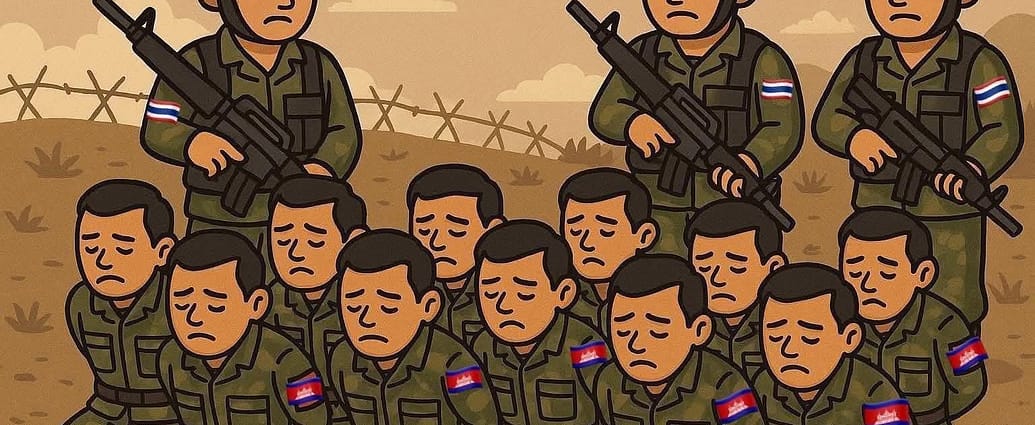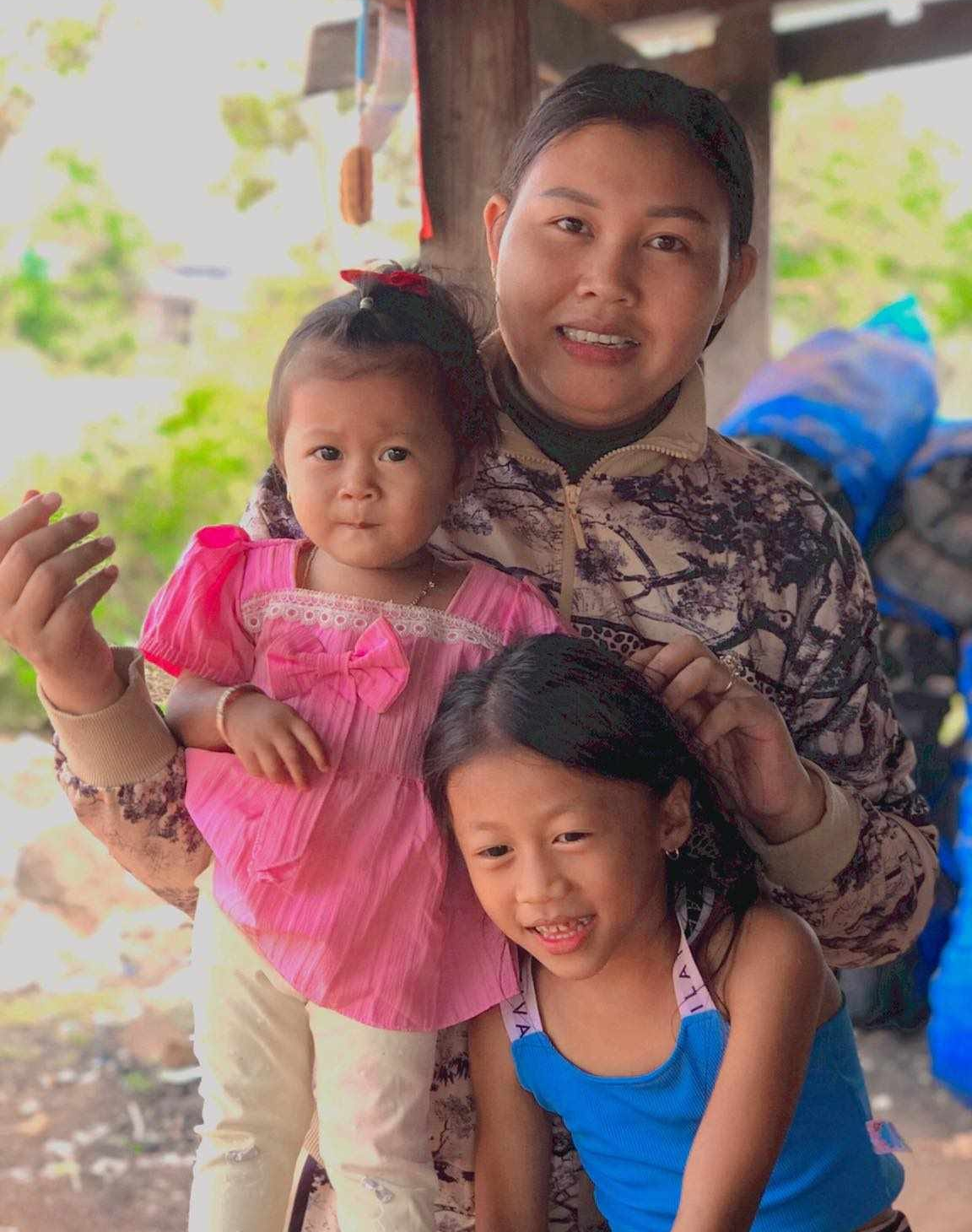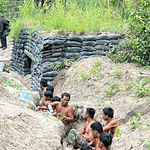A handshake of peace crumbled into betrayal when Thai forces lured Cambodian soldiers at the Chong Te border crossing on the morning of July 29, 2025, just several hours after a Malaysian-brokered ceasefire. According to Chan Sopheatra, commander of Cambodia’s Preah Vihear military operation area, the Thai side invited the Cambodian soldiers forward for a “commemorative photo together.” As the Cambodians approached in good faith, hidden Thai troops emerged from the forest, rifles raised, and seized them. In the chaos, one Cambodian soldier was killed on the spot, while 20 were taken captive.
The deception has now stretched into 40 days. Only two soldiers were released on August 1, 2025, both in harrowing condition—one unable to walk, the other shattered by psychological trauma. On July 31, the body of the slain soldier was returned to Cambodia, a somber handover that deepened national grief. Eighteen soldiers remain in Thai custody, their fates uncertain.
This act, steeped in ultranationalist zeal, not only violated the 1949 Geneva Conventions but also plunged Southeast Asian diplomacy into crisis. Cambodia condemns Thailand’s calculated trap as military-driven diplomacy at its lowest, echoing extremist tactics rather than peaceful engagement. The soldiers’ families, wracked with anguish, continue to wait for justice, as the world is called to condemn this affront to humanity and demand the unconditional release of the remaining captives.
A Ceasefire Betrayed
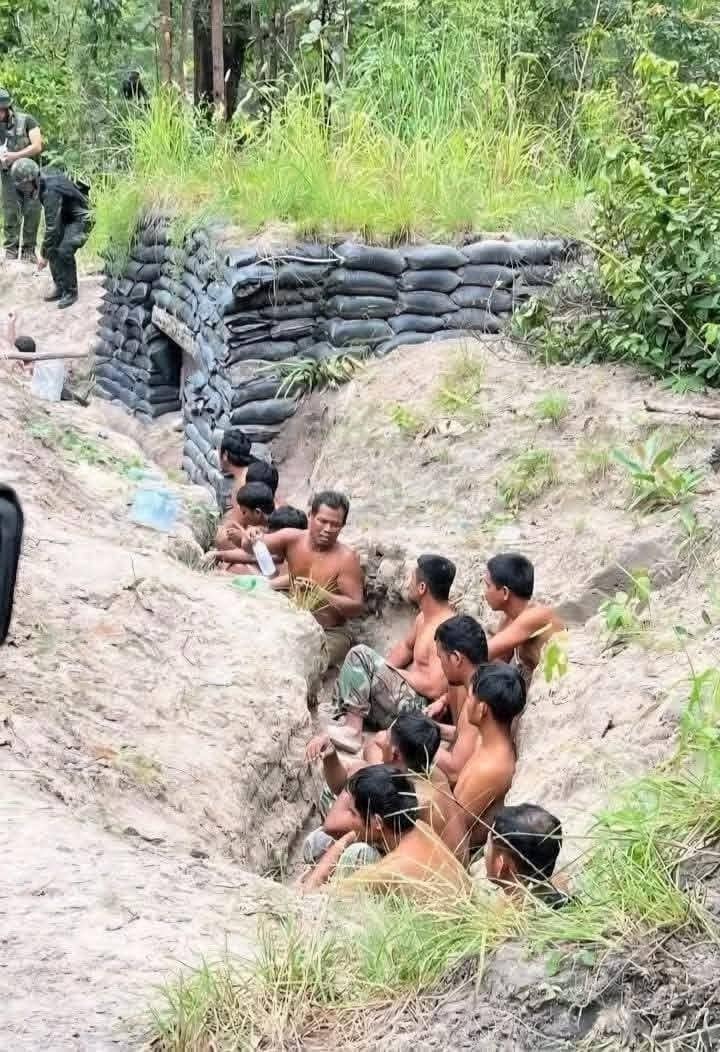
The five-day conflict, which lasted from July 24 to 28, 2025, left the borders scarred—villages were burned, schools and hospitals were destroyed, and precious cultural sites were hit by artillery fire. Hundreds of thousands escaped, holding children and fragments of their lives, while a dozen innocents were killed. With backing from the US, China, and ASEAN, Malaysia’s prime minister secured a critical ceasefire on July 28, allowing fatigued soldiers to hope the conflict had reached its end.
However, at 7:50 AM the following morning, faith was broken. 20 Cambodian soldiers were lured forward for a handshake and a photo before being ambushed by Thai troops hiding in the forest. Rifles were fired, one man was killed instantaneously, and the others were carried away. Two were later returned, damaged in body and mind—dark hints of torture. Eighteen remain in Thai hands.
Broken in Body and Spirit
The fate of three jailed soldiers paints a devastating picture of human agony. On August 1, two were repatriated at the O Smach checkpoint in Oddar Meanchey province, Cambodia. The first, a young soldier from a small town, was almost unrecognizable—his legs were paralyzed, his body was malnourished, and his eyes were blank, staring into a void etched by dread and anguish. Witnesses murmured about a guy who was broken not just physically but also spiritually, with each movement a battle against unseen chains. The second, an experienced corporal, staggered forward incoherently, ranting in disjointed phrases. His mind, wrecked by lengthy solitude and psychological suffering, appeared detached from reality. Cambodian doctors found symptoms compatible with severe PTSD, a disturbing reminder of prior national traumas, while the Cambodian Human Rights Committee accused the government of torture and denied medical assistance. Thailand has dismissed these allegations. [Watch video] The third soldier, slain in the ambush, returned only as a body, a quiet witness to the betrayal that defined the men’s tragedy.
Families of the detained Cambodian soldiers are trapped in unending anguish. Ros Srey Nan, whose husband was among those seized, whispered through tears: “I am so worried about him. I don’t know when he will be sent back. It has been a long time. I don’t know how he was doing. I just lie in bed and wait for him to come back. I hope the government will find a solution to bring him back soon.” Provincial authorities visited her and urged patience. “I am going crazy!” she admitted. “He is a thin and soft-spoken man, but I don’t know how his health is now. It’s difficult to say. I miss his face and voice.”
Similarly, Korn Savjai, wife of Private Chiev Bunchhong, recounted her ordeal: “I knelt down and cried until I could barely breathe. My whole body went numb that first week.” Battling her own health issues, she forces herself to stay strong for her daughters: “Even though I struggle with my own lung problems and emotional stress, I force myself to stay strong for my daughters… My two-year-old develops a fever whenever she waits too long for her father. I pray constantly for his safety, even when my mind runs to dark places.”
The children feel the absence keenly. “I miss Dad. I want to see him now. I want to ask him for money to buy my school materials,” said Savjai’s young daughter. Cheav Sreymom, Chiev’s sister, reflected the family’s torment: “After the ceasefire, we wondered why my brother never called, when so many others did.”
Every home waits with hollowed hearts; every mother, spouse, and sibling is torn between hope and despair, longing for the safety and return of loved ones who went forward in trust and loyalty.
Sources: CHRC, Khmer Times, CamboJA, Cambodianess, Manila Times
Violations of International Humanitarian Law
Thailand’s detention of Cambodian soldiers violates the 1949 Geneva Conventions, which both nations signed—Thailand in 1954 and Cambodia in 1958. Under Article 4 of the Third Geneva Convention, the 20 captured Cambodian soldiers qualify as prisoners of war (POWs). This status creates specific obligations for Thailand, including prohibiting indefinite detention after hostilities end.
Key violations include:
- Article 118 requires prisoners of war to be released and repatriated promptly after active hostilities end. Though the ceasefire on July 28 concluded the conflict, Thailand still holds 18 soldiers, citing vague “legal procedures” and border security concerns.
- Articles 70 and 71 guarantee prisoners of war the right to communicate with their families within one week of capture. The lack of allowed contact raises serious concerns about isolation and possible psychological mistreatment.
- Rule 128 of Customary International Humanitarian Law reinforces the obligation for prompt release after hostilities end, emphasizing that humanitarian responsibilities outweigh political or tactical considerations.
Cambodia’s Permanent Mission to the UN in Geneva has condemned these actions as violations of international humanitarian law. The Cambodian Human Rights Committee petitioned UN High Commissioner Volker Türk on August 1, requesting an investigation, accountability measures, medical care, and a fact-finding mission. Evidence suggesting torture may also violate the Convention Against Torture and prohibitions against inhumane treatment.
Low Diplomacy
Thailand’s handling of the 2025 detention demonstrates blatant “low diplomacy”: prioritizing short-term tactical gains over regional trust and lasting peace. Analysts argue that the detained soldiers were used as bargaining chips in border negotiations—a strategy condemned by international norms and adversely impacting ASEAN cohesion
This incident continues a decade-long pattern of border tensions. In 2008, Cambodia’s registration of Preah Vihear Temple as a UNESCO World Heritage site triggered clashes with Thai forces, resulting in casualties on both sides. The situation worsened in 2011, necessitating ICJ intervention and ASEAN mediation. In 2013, the ICJ confirmed Cambodia’s sovereignty over the temple, though disputes about surrounding territories remain unresolved. These persistent conflicts highlight the weakness of bilateral resolution mechanisms and threaten ASEAN’s regional solidarity.
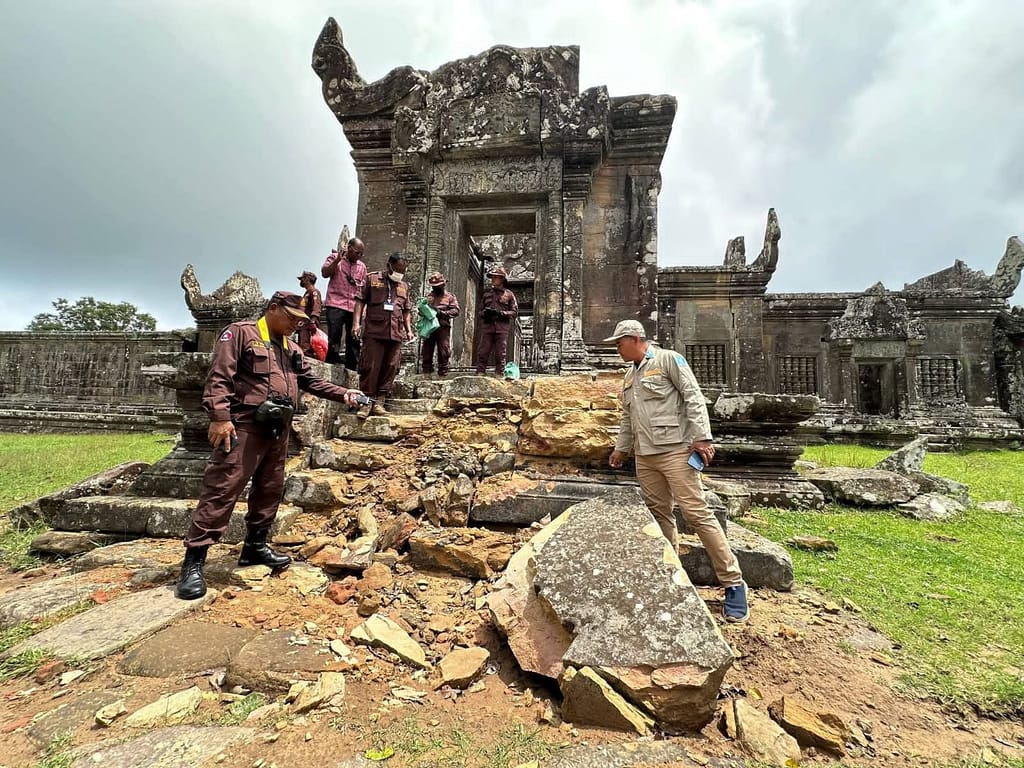
Cambodia’s appeal to the UN reflects a loss of faith in bilateral dispute resolution, while social media outrage amplifies international condemnation, portraying Thailand’s actions as arbitrary and abusive. Thailand’s insistence on bilateral meetings raises concerns, as negotiations become inherently skewed when one side seeks to dominate, sidelining fairness, transparency, and accountability.
For diplomacy to succeed, Thailand must immediately release the remaining soldiers, provide transparent reporting on the missing and deceased, allow independent verification of treatment, and engage in good-faith negotiations over the disputed border. Failure to act perpetuates mistrust and undermines regional stability.
Call for Action
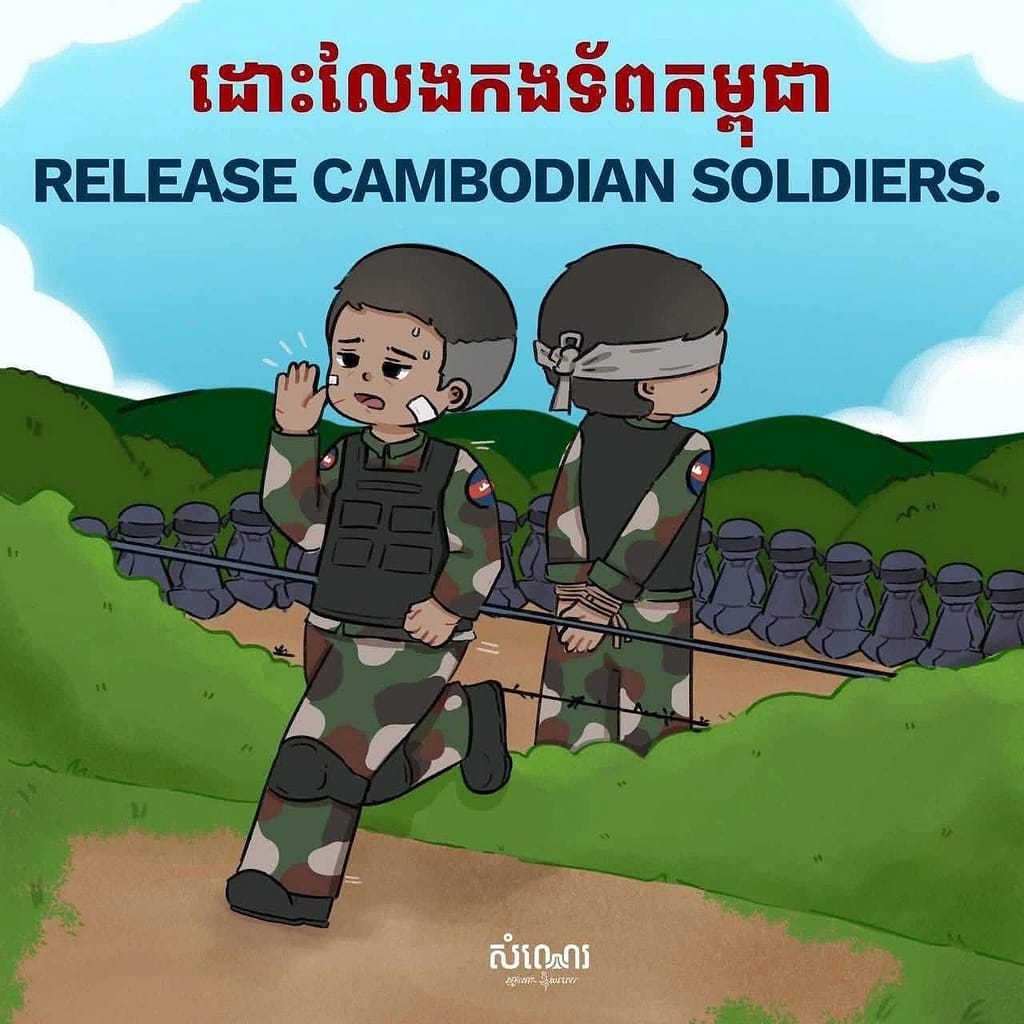
Thailand must release the remaining Cambodian soldiers immediately and unconditionally, as required by Article 118 of the Geneva Conventions. The UN Security Council, ASEAN, and human rights organizations should apply diplomatic pressure, consider sanctions, and conduct independent investigations into allegations of torture. Cambodia calls on global citizens to support petitions advocating for the soldiers’ release, drawing inspiration from successful precedents like the Ecuador-Peru peace accords. Swift action is essential not only to uphold international law but also to bring justice to these soldiers—the paralyzed private, the traumatized corporal, and the fallen soldier—and restore peace to their grieving families.
Conclusion
The events of July 29, 2025, expose the catastrophic consequences when trust, law, and diplomacy are abandoned. A handshake meant to symbolize peace became a trap: one soldier was killed, two returned in body and mind shattered, and 18 were still held in captivity after 40 days. Thailand’s actions flagrantly violate the Geneva Conventions, defy customary international humanitarian law, and undermine decades of fragile border diplomacy between the two nations.
This betrayal reverberates far beyond the soldiers themselves. Families remain in anguish, communities live in fear, and ASEAN’s credibility is tested, recalling a decade of recurring clashes over Preah Vihear Temple. The international community faces a moral and legal imperative: to condemn these violations, demand immediate and unconditional release, ensure accountability for mistreatment, and safeguard the principles that govern warfare and human dignity.
Justice for the paralyzed private, the psychologically traumatized corporal, and the fallen soldier is urgent. Their ordeal is a stark reminder that true diplomacy cannot coexist with coercion or cruelty—and that only through law, transparency, and accountability can trust and peace be restored.
